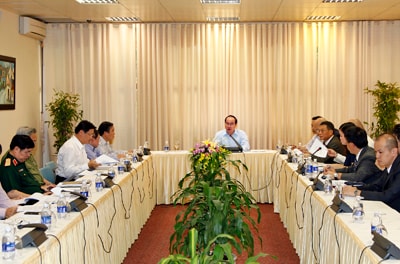Cooperation with Germany and Japan – a strategic direction in human resource training
Yesterday, July 13, in Hanoi, under the chairmanship of Deputy Prime Minister Nguyen Thien Nhan, the National Steering Committee for International Integration in Education, Science and Technology held a plenary meeting.

Speaking at the meeting, Deputy Prime Minister Nguyen Thien Nhan emphasized that the issue of integrating education, science and technology has been implemented by ministries, branches and localities for many years and achieved positive results. However, this activity is still scattered, overlapping, lacking inheritance, not highly effective, and has not created a breakthrough in the development of education, science and technology in the country.
The Deputy Prime Minister stated that the Government has determined that our country has entered a new stage of development strategy with many new opportunities in international integration with strategic partners, countries strong in education, science and technology, and having friendly relations with Vietnam. The Prime Minister's establishment of this Steering Committee also aims to seek potential partners to create a breakthrough in the development of education, science and technology for Vietnam.
The Deputy Prime Minister said that in the integration process, the Vietnamese Government sees German and Japanese enterprises as important partners in being ready to receive human resources and train human resources for Vietnam in large numbers and long term. In the coming time, there should be solutions for Vietnamese educational institutions to coordinate with these enterprises to train human resources most effectively.
The right and feasible direction
At the meeting, the representative of the German Business Association, Mr. Vo Quang Hue, chief representative of the German Bosch Group in Vietnam, said that the Vietnamese Government's attention to international integration in education, science and technology is a very correct and feasible direction and will bring about quick results in the near future.
However, to achieve this, the Government needs to make more efforts to deal with challenges in quality as well as in human resource training.
Mr. Vo Quang Hue also said that currently in Germany, businesses are implementing a dual training system by cooperating with vocational training institutions and universities. This cooperation involves providing internship programs at companies and providing scholarships to students. So far, these programs have achieved many encouraging results, with trainees having more practical access.
Mr. Munakami, Chairman of the Japan Business Association, said that recently, through the basic research process of JICA, Japan also conducted a survey to determine the human resource needs of Japanese enterprises in Vietnam. Japanese companies believe that, in terms of basic working knowledge, Vietnamese workers need to clearly understand the organizational principles, welfare regimes and working time at the company rather than acquiring high professional skills in the initial stage; at the same time, they need to be more patient because time is the best test for newly graduated engineers.
Representatives from Japan and the Federal Republic of Germany also suggested that Vietnamese ministries and sectors should study and amend regulations so that workers commit to staying with the company for long-term work. In addition, German and Japanese enterprises should be considered as strategic partners in professional education.

Deputy Prime Minister Nguyen Thien Nhan: It is necessary to affirm Vietnam's commitment to fully meet the human resource requirements of businesses.
Affirming Vietnam's commitment
Concluding the meeting, Deputy Prime Minister Nguyen Thien Nhan assigned the Ministry of Education and Training and the Ministry of Labor, War Invalids and Social Affairs to draft a cooperation program with the German and Japanese Business Associations on improving training quality and providing human resources for German, Japanese and Vietnamese businesses for the period 2013-2015.
Regarding the deadline, in September 2012, signed an agreement with the German Business Association and in October 2012, signed with the Japanese Business Association.
Regarding cooperation between Vietnam and the German Business Association, the Deputy Prime Minister suggested that ministries and sectors need to provide forecast information on human resource needs for German businesses in Vietnam. The Ministry of Labor, War Invalids and Social Affairs, the Ministry of Education and Training, and German businesses should unify the list of training and occupational qualifications for human resources so that this information can be used as long-term data.
The Deputy Prime Minister requested the gradual implementation of dual training at a number of Vietnamese training institutions and German enterprises in Vietnam, and the urgent announcement of information on 100 German enterprises in Vietnam that are ready to receive Vietnamese students for internships.
Regarding determining training costs as production costs, the Deputy Prime Minister requested that the Ministry of Finance provide specific and strict instructions before August 30 to facilitate businesses.
For the Japan Business Association, based on the forecast of Japanese human resource needs in Vietnam, the two sides will work with Vietnamese training institutions to prepare a special mechanism when training human resources for Japan.
The Deputy Prime Minister asked ministries, branches, research institutes and national universities to closely coordinate in human resource training, affirming Vietnam's commitment to strive to fully meet the human resource requirements of Japanese and German enterprises.
According to (Chinhphu.vn)-LT


